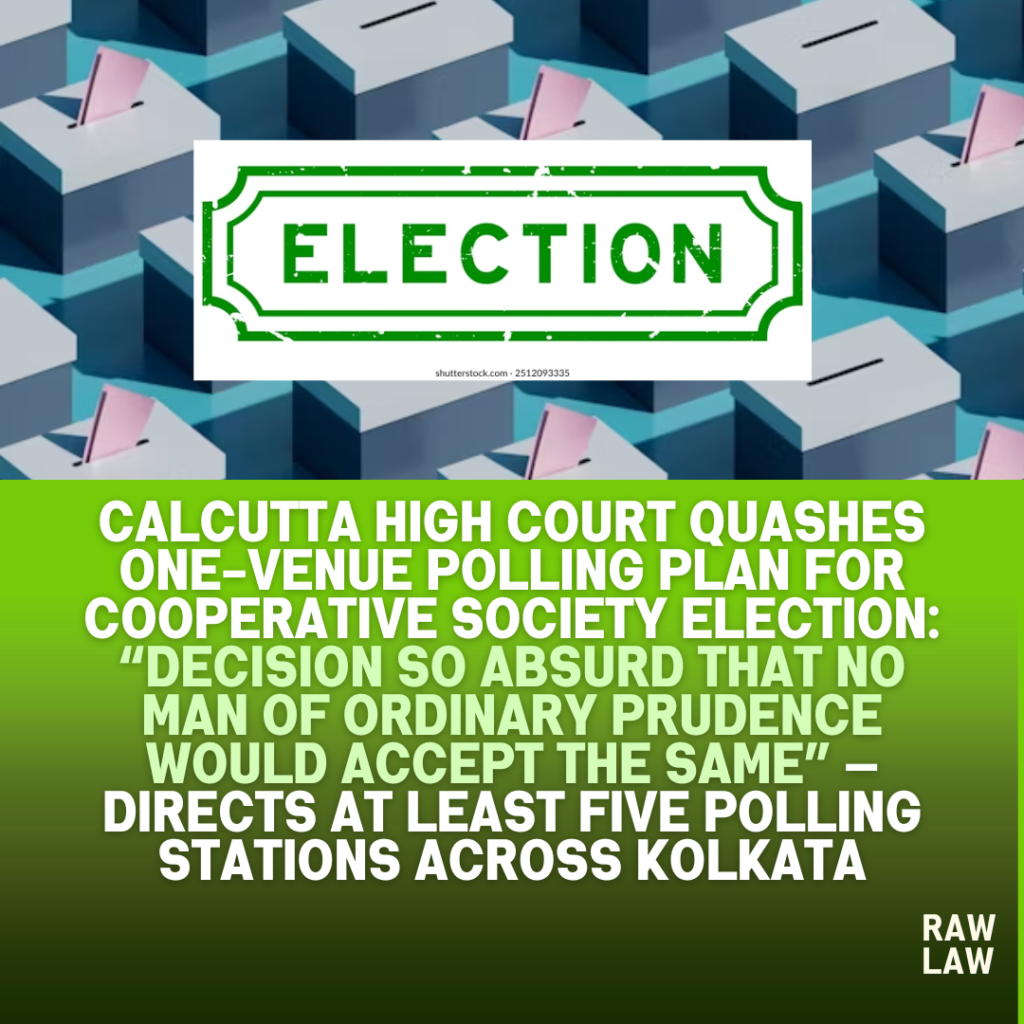Judgment Name: Mainak Goswami & Anr. v. State of West Bengal & Ors. (with) Sagar Prasad & Anr. v. State of West Bengal & Ors.
Date of Judgment: 17 June 2025
Court: High Court at Calcutta
Coram: Justice Raja Basu Chowdhury
Court’s Decision
The Calcutta High Court quashed the decision of the Assistant Returning Officer to hold elections for the Calcutta Tramways Employees Cooperative Credit Society Limited at a single polling station in Kolkata between 10 AM to 2 PM on 22 June 2025. Terming it “irrational and unjustified,” the Court held that such a move would cause undue hardship to members of the cooperative society. The Court directed that at least five polling stations be set up across Kolkata, and the revised election venue be published on or before 20 June 2025.
Facts
The petitioners, members of the Calcutta Tramways Employees Cooperative Credit Society, challenged the Assistant Returning Officer’s decision to hold the upcoming elections at a single venue—Jogesh Mime Academy, Kalighat. In 2015, when the voter count was 5308, the election had been held at 11 different polling stations across Kolkata. In contrast, for 2025—with 1097 voters—the election was confined to one polling location. Despite a representation signed by 401 members requesting additional venues, no action was taken, prompting the writ petitions.
Issues
- Whether holding elections at a single polling station was reasonable and fair.
- Whether the discretion exercised by the Assistant Returning Officer could be judicially reviewed.
- Whether the rights of cooperative society members were violated due to this administrative decision.
Petitioners’ Arguments
The petitioners argued that:
- Members were spread across various depots in Kolkata and beyond, and having only one polling station was logistically oppressive.
- Many members were required to work even on holidays, making it difficult to vote during a limited four-hour window.
- The democratic rights of members were being undermined.
- A previous representation signed by 401 members had been ignored by authorities.
Respondents’ Arguments
- The State contended that under Regulation 3(3)(iv) of the West Bengal Cooperative Election Commission Regulations, 2012, the Returning Officer has discretion to fix polling venues.
- The Cooperative Election Commission claimed that the drastic reduction in voter count (from 7000 to 1097) justified holding the election at a single venue.
- They argued that no other members apart from the petitioners had opposed the venue decision.
- The Assistant Returning Officer supported this, citing logistical decisions and a 2018 notice to justify not using the earlier depot-based model.
Analysis of the Law
The Court examined Regulation 3(3)(ii)-(iv) of the 2012 Regulations, which provides discretion to the Returning Officer regarding election logistics. It acknowledged the general non-interference principle laid down in Secretary, West Bengal Cooperative Election Commission v. Commissioner, WB Cooperative Election Commission (2017) but emphasized that such discretion must still meet standards of reasonableness and proportionality, as per Wednesbury principles.
Precedent Analysis
- Secretary, West Bengal Cooperative Election Commission v. Commissioner, West Bengal Cooperative Election Commission & Ors. (MAT 339 of 2017)
- Held that the Returning Officer is not obligated to provide reasons for change of venue unless it affects neutrality and fairness.
- Distinguished in this case due to different factual matrix—here, the issue was not the change but the irrational restriction to one venue.
- Held that the Returning Officer is not obligated to provide reasons for change of venue unless it affects neutrality and fairness.
- Sanjay Ghoshal & Ors. v. State of West Bengal & Ors. (WPA 8928 of 2025)
- Used to argue minimal judicial interference in election decisions.
- Again distinguished due to the peculiar facts in the current matter.
- Used to argue minimal judicial interference in election decisions.
Court’s Reasoning
The Court observed:
“Fixing one particular venue on a holiday so as to justify the same does not appear to be reasonable… The decision taken by the Assistant Returning Officer was so absurd that no man of ordinary prudence would accept the same.”
It held that the discretion was exercised in a manner violative of the Wednesbury principles of reasonableness, and failed to address the real logistical challenges faced by members.
Conclusion
The Court:
- Quashed the decision of the Assistant Returning Officer.
- Directed setting up of at least five polling stations across Kolkata.
- Mandated that revised venues be published by 20 June 2025.
- Directed the Joint Commissioner of Police to ensure adequate security.
- Held that the petition was maintainable, especially since 401 members supported it.
Implications
- The judgment reaffirms the Court’s power to intervene in election administration where discretion is exercised arbitrarily.
- It safeguards voter accessibility and fairness in cooperative society elections.
- Establishes that administrative discretion must be exercised judiciously even in seemingly internal matters like polling logistics.
Judgments Referred & Their Role
- Secretary, WB Cooperative Election Commission (2017)
- Cited to argue Returning Officer’s discretion; distinguished based on facts.
- Cited to argue Returning Officer’s discretion; distinguished based on facts.
- Sanjay Ghoshal v. State of WB (2025)
- Relied upon to resist interference; rejected as facts were substantially different.



